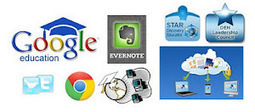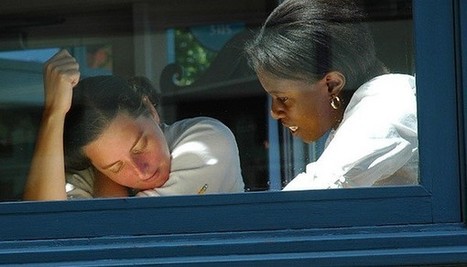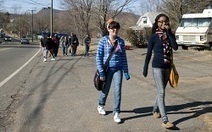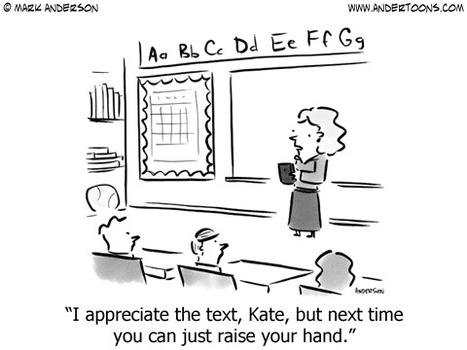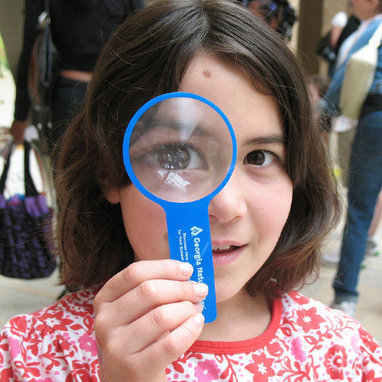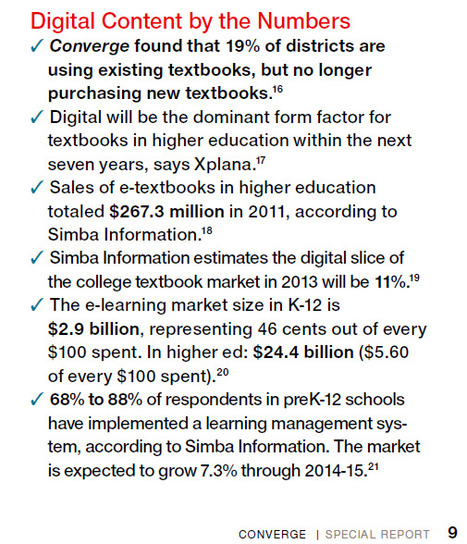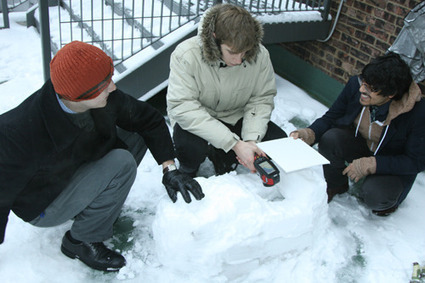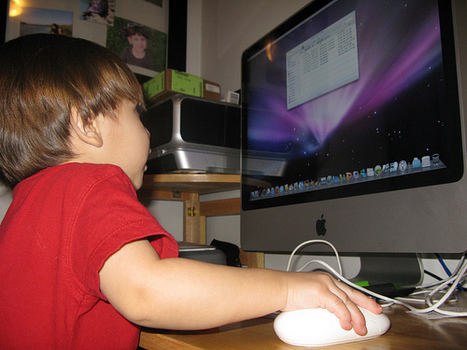Click closer to scan this sketch and you just might learn something new. If anything, you’ll get a peek into the value of what a “graphic facilitator” can provide to a discussion....
Get Started for FREE
Sign up with Facebook Sign up with X
I don't have a Facebook or a X account

 Your new post is loading... Your new post is loading...
 Your new post is loading... Your new post is loading...
What should the goals of gifted education be? Perhaps the goals of all education forall children... “Rather than portray the needs of gifted students as being unique, we suggest weaving them into the general education tapestry. To accomplish this, we would revise the chief goal of gifted education to be the chief goal of all education: to ensure that all students receive the education appropriate for them at any given time by maximizing the match between individual students’ educational experiences with their individual educational needs.”
This PBS Learning Media Infographic explores teachers and technology. What do teachers want in the classroom? Briefly, more technology, affordable technology, web-based tools, and to engage students. For more specific information check out the infographic!
"...school assessment lives primarily in the bottom left part of that graph, and that we rarely if ever get to the “immeasurable” stuff that resides toward the top right. To put it another way, we focus in schools on that which is quantifiable when, I think, our real value as places of learning rests in that messy stuff that isn’t." Make a comment on this by going to Will Richardson's post.
Do you share technology in your school? There are many ways to "get the most out of shared resources" at school, and this post has six tips and ideas to help you "maximie the time you have access to shared resources." Each tip provides suggestions to help you effectively share computer resources. Tips include: * Model your new tool or website in your classroom. * Make sure that you have used the tool and created the product you would like your students to create. Take into consideration how much time your students will have. * How will your students hand in their work? Will they use a dropbox of some sort or will they place it in a shared folder? Make sure the students understand how to use this tool. Three additional tips are included in this post.
Textbooks vs e-Books - What do students prefer? The marketing from Student Monitor surveyed 1,200 students enrolled full-time at 4 year colleges and universities. To learn more check out the infographic.
"Slate magazine has been running several articles on education this week, including two today that are of interest. This one by Konstantin Kakaes is worth looking at more closely, if only because it somehow manages to gather almost every wrong idea about technology in education in existence into a single, compact article." Talbert critiques the article 'Why Johnny Can't Add Without a Calculator' making the point "Technology neither improves or diminishes learning. It’s the instructional design choices made and instructional practices used by individual teachers with individual students that do this." Can technology transform education? Read on to learn more.
"As technology advances, a greater number of countries are embracing the use of it in classrooms. While the U.S. is moving in that direction there seems to be some hesitation in deciding what technology should be used. Other countries are focusing on how to integrate it while we determine if we should. Here is a list of four ways technology is changing the face of education."
"Paul Barnwell’s article “Why Twitter and Facebook aren’t Good Instructional Tools” is a ruse…in a good sense. I think it’s a brilliant way to get a whole load of readers coming to the defense of social media tools in the classroom. But take a minute to read what he’s written and you’ll see it’s not an attack, it’s a call to action.
"Culture Shift: Teaching in a Learner-Centered Environment Powered by Digital Learning, examines the support that educators and schools will require to implement genuine teaching practices that are personalized for each student. Digital learning, the report argues, can be a major strategy for enabling teachers to meet varied students’ needs while also supporting necessary cultural shifts in teaching. According to the report, learner-centered instruction is personalized, rigorous, and based on college- and career-ready expectations. It is also collaborative, relevant, and flexible, with learning taking place anytime or anywhere. A true shift to a learner-centered environment powered by effective technology requires a strong school culture that embodies, encourages, and focuses on the needs of each student, the report argues. Specifically, Culture Shift maintains that the integration of technology and digital learning, school leadership, and changes in the teaching profession are critical to the transition to this new culture."
From
edudemic
"Rapid technology change is here to stay. No sense in trying to change the way the world works–at least when you’re messing with the wallets of major corporations. This kind of change introduces threats to education, which we talked about in part 1. There is likely very little that can be actively done to reduce these threats, as they are first economic issues. But we can begin to understand them better." The five issues explored in this article are: * Increases need for persistent, informal “PD” * Arms “fringe” adoption resistance * Swells adoption cost * Emphasizes role of learner * Exposed needs or new thinking habits Part 1 of this series, "3 Threats of Rapid Technology Change" is located at http://edudemic.com/2012/05/3-threats-of-rapid-technology-change/.
Amanda Lenhart spoke to the “Media and the Well-Being of Children and Adolescents” conference at the Annenberg Public Policy Center at the University of Pen... Amanda focused on bringing together data that highlights the demographic differences among groups of youth in their adoption, use and experiences with technology and social media. While such data may have illustrated what was called a “digital divide” in the past, it now highlights a variety of digital differences among groups of youth. This talk brings together data previously shared in a variety of reports on youth as well as some new analysis.
Quoting from the post: "The Ethics and Responsibilities of the 21st Century Classroom: A Collaborative Guide to Best Digital Learning Practices for K-12 Teachers and Administrators PREAMBLE: Tools aren’t teachers, they aren’t students, and they aren’t magic. We need to know the limits and possibilities of our twenty-first century tools and the role of teachers and administrators in ethically and responsibly using digital media to enhance and foster learning." This is a "public, participatory document" and folks are invited to add their ideas and concerns. Some of the other areas addressed include: teacher training and time for collaboration, administrators taking the lead with digital technology and encouraging high quality student input and output. |
A look at what hapened at Plymouth South High School last year when one class "attempted to transform the traditional research process to a completely paperless one using a fresh cart of iPads." A number of goals were "outlined prior to the research process" and included (quoting from the post): * Students will crowd-source their research to a collective research group. * Students will incorporate varied media types into their research: web based text, traditional text, audio and video. * Students will work collaboratively with their teacher and classmates on their research and writing process. * Students will become proficient researching and writing in a digital environment. The post alos discusses the process of going paperles and "moving forward and going paperless." 
Susy Parsons's curator insight,
April 13, 2014 7:20 AM
Is going paperless in schools really an option with todays digital technology advances?
"Polarization has come to public education, big time. If it persists, at the end of the day we all are going to lose." John Merrow looks at how polarized education has become in this post. He provides statistics such as (all quoted): * Half of our kids get no early education; * 22% of our children live in poverty, and; * 25% have chronic health conditions like asthma or obesity. He follows this discussion with seven ways that "we have become polarized about education." A few of the ways include: * We are polarized about accountability. * We are polarized about the role of technology. He then asks that we think about four words (which you will find in his article) and asks that we look at the need to move beyond polarization. This article has made me look more deeply at many issues confronting education.
Gleeson shares three scenarios that may happen in your classroom (they did in his) and in each case the result was that the students were not able to use the Internet. When we work with technology things often happen, and the end result may be the lesson plan that you had goes out the window. This post asks us if we are prepared for these types of scenarios and raises some other questions that may be considered. http://mgleeson.edublogs.org/2012/07/05/web-2-0-for-the-under-13s-crowd/. (It is also in this Scoop.it).
This post shares an experience in the Texas City High School and the implementation of a "digital media an design project with high school students." The author had worked with the school during the school year and observed many challenges including "the daunting and daily task of keeping students academically engaged; the corrosive effects of chronic absenteeism in the classroom; the impact of economic and familial instability on students, teachers, and schools; and the creative ways youth from poorly resourced schools and households are using digital media." They set to work with a goal: "could we work with teachers and students to create a more dynamic learning environment?" Read the article to see the project that was developed and what they have learned.
Where is emerging technology heading? What may become mainstream in coming years? Here is one view of what the future may bring. You may look at this as a roadmap for students in STEM. This file is also available at http://envisioningtech.com/ as a screen-optimized PDF, a print-optimized PDF and a high resolution PNG.
From
www
The tech giant's offering a free online class that'll teach you all the tips and tricks you need to master search. That's right...a free course that promises to teach users "tips, tricks and tactics" to help you "find what you are looking for." Registration is open thru July 16th, but the first class will be on July 10th. Classes will be posted Tueday, Wednesday and Thursday the week of July 9th and 16th with course related activities ending in July 23rd. For more information or to register: http://www.google.com/insidesearch/landing/powersearching.html .
"...we need to find a way to embrace all forms of technology in the classroom and use them to our advantage. By training students to use technology appropriately and effectively and providing opportunities for them to reach learning targets through its usage, we create a situation in which students are engaged in learning. We also free ourselves from the constant cycle of fighting against students."
"So, what should a school in the 21st Century look like? Well, it’s more than just filling a classroom with tech. It’s about ensuring that five year olds are getting ready for a future that no-one is really be able to predict until they are much older. That also means supporting teachers and giving them the skills to help their students achieve this. Helping teachers understand why it is important for them to use it, so that they can provide useful experiences for their students."
Converge has published a special report that “examines…education transformation in all its facets: from curriculum acquisition to best practices for a successful transition to key governmental policies.” The report discusses a wide range of subjects. After an Introduction and The Big Idea (as in textbook reformation) the sections are So You Want to go Digital – Now What? (with 7 articles); Policy and Legislation: Where Has It Been and What’s Coming?; Barriers to Success – And How To Hurdle Them (3 articles); What The Future Holds; and The Reformation in Action. Technology concerns, plagiarism and copyright, professional development tips, digital content by the numbers and much more is covered.
"The most impressive technology-rich classrooms don't look like classrooms. Instead, they look like creative businesses on deadline—like advertising agencies pulling together a big campaign, architectural firms drawing up blueprints, or software companies developing new programs." So, what would a new school look like? Reich compares schools to a "creative agency" where "enable students to collaborate with peers, pursue their interests, publish their work to the world, and take greater responsibility for their own learning."
How do you train an innovator? Which schools are doing it better than others? Are teachers equipped with the new skills required to educate students in this decade? This post explores these questions and offers five "essential education and parenting practices that develop young people's capacities to innovate." The first one is "Learning to work collaboratively (innovation is a team sport!)." The concepts of information and knowledge are also explored, beginning with the statement "Information may be free but knowledge also includes understanding, problem solving, communication, and collaboration, none of which is free." Are we addressing these 21st century skills as our students move from elementary school through high school, or our teachers "...compelled to teach to the tests for accountability purposes..."? Additional topics are also explored, including AP testing (and the move to have students "demonstrate that they can apply knowledge learned and not merely regurgitate it" to the fact that many when you look at CEO's of most major companies "the majority did not go to an Ivy League school for undergraduate..." An article that will make you think...
Are you looking for videos to use for presentations and lessons related to technology and media literacy? If so, this wiki may lead you to some great resources. The videos are divided into the following categories: * Conversation Starters * 21st Century Learning * Copyright, Copyleft & Remix/Mashup Culture * Influence of Media on Society * History of Technology & Media * Social Networks & Identity * Mashups, Stop Motion, Animation & Short Films * Public Service Announcements & Political Messages * Cyberbullying & Internet Safety * Documentaries The site does state that "these videos are of varying quality, cross several genres, and are of varied suitability for classroom use." 
Erin Collier-Plummer's curator insight,
November 3, 2017 2:42 PM
A storehouse of great media literacy teaching tools!
|


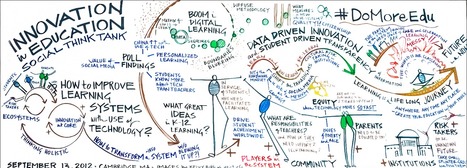


![Why Teachers Want Technology - Survey from PBS [Infographic] | Eclectic Technology | Scoop.it](https://img.scoop.it/Vv9NKVDzhVBJQnPkzX0ZxTl72eJkfbmt4t8yenImKBVvK0kTmF0xjctABnaLJIm9)




